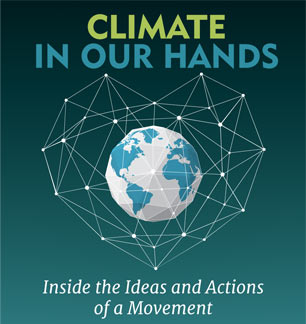
This story is part of the Climate in Our Hands collaboration between Truthout and YES! Magazine.
As the United Nations Climate Summit in New York City approaches, efforts to address climate change through money-moving campaigns are growing.
This past January, 17 foundations with combined assets of nearly $2 billion pledged to divest from fossil fuels and invest in clean energy.
For the past few years, this work has mostly been about divestment—people and organizations pledging not to invest in fossil fuel companies. First, students concerned about the future of the climate pressed their colleges and universities to divest from stocks in coal, gas, and oil. More than 10 small schools, including the University of Dayton, Hampshire College, and the College of the Atlantic, have complied. And, in the largest divestment in the sector, Stanford University pledged in May 2014 that its $18 billion endowment would not be invested in coal.
But it’s not just colleges and universities that are divesting. Pension funds, municipalities, philanthropies, and hospitals have joined in too—as well as individual investors.
Those divestments haven’t directly hurt the finances of companies like Exxon Mobil, but that was never the strategy. Instead, the campaign has isolated fossil fuel companies, weakened their political power, and commented on the failure of governments to take action on climate change.
But where should organizations put their money, if they aren’t putting it into fossil fuel companies?
 That’s the question behind the movement’s new strategy, known as “divest-invest,” which seeks to make divestment more effective by taking funds previously invested in fossil fuels and reinvesting them in renewable energy and sustainable economic development.
That’s the question behind the movement’s new strategy, known as “divest-invest,” which seeks to make divestment more effective by taking funds previously invested in fossil fuels and reinvesting them in renewable energy and sustainable economic development.
And it’s more than just a strategy—“Divest-Invest” also refers to a growing coalition of foundations who’ve made the pledge, as well as to an online portal of activity that provides information about doing so.
The approach is catching on. This past January, 17 foundations with combined assets of nearly $2 billion pledged to divest from fossil fuels and invest in clean energy as part of the Divest-Invest Philanthropy initiative. Since that time, dozens more have committed to do the same. Their names are scheduled to be released on September 23, during the United Nations Climate Summit.
An ethical and financial strategy
Pension funds, municipalities, philanthropies, and hospitals have joined in too—as well as individual investors.
Back in 2012, climate change’s “terrifying new math”—as 350.org founder Bill McKibben called it—brought new urgency to the climate crisis. Scientists had demonstrated that 80 percent of the world’s current fossil fuel reserves needed to stay in the ground to prevent the worst scenarios, in which the planet warms by more than 2 degrees Celsius. Yet the oil, gas, and coal sectors intend to burn them all, and continue to invest more than $600 billion a year finding new ones.
After the collapse of 2009 U.N. climate talks in Copenhagen and the failure that same year of the United States Congress to pass legislation to reduce carbon emissions, activists called for a re-evaluation of strategies.
Divestment has emerged as one of the most promising. An indirect approach to reducing carbon emissions, divestment sidesteps a political system captured by oil, gas, and coal corporations. Similar strategies were essential to the regulation of the powerful tobacco industry in the 1990s.
The case for divestment is both ethical and financial. A number of studies indicate that divesting a portfolio from fossil fuels can be done without damaging financial returns (for example, see this analysis by the investment management firm Aperio Group ).
In fact, the risky thing to do may be retaining investments in fossil fuels. If movements succeed in pressing for carbon regulation, assets in the sector could become “stranded” and worth less, driving down investment returns.
Financing renewables
Global investment in clean energy peaked in 2011 at nearly $318 billion, according to Bloomberg New Energy Finance, but has declined since then. Some in the climate movement believe that a focus on reinvesting funds could change that.
“Individual investors can catalyze quicker transformation … by increasing demand for fossil-free financial products.”
Groups rallying around the idea of divest-invest are urging policymakers, businesses, and investors to accelerate the transition to a low-carbon economy and invest deeply in renewable energy. Investments in that sector made during the next 15 years are likely to be a a major determining factor in the climate’s future, according to a new report by the Global Commission on the Economy and Climate.
There’s a role for individuals to play as well. Organizers from student and philanthropy divestment movements have launched Divest-Invest Individual, a campaign to enlist individual investors in a pledge to divest from fossil fuels over the next five years.
“Individual investors can catalyze greater and quicker transformation of business as usual by increasing demand for fossil-free financial products and other alternative economic vehicles,” said Lisa Renstrom, co-chair of Divest-Invest Individual.
Meanwhile, the divestment movement continues to gather steam. This spring, the Norwegian government created an independent panel to review whether the country’s sovereign wealth fund should be divested from oil, gas, and coal. And major religious groups in the United States and the General Synod of the Church of England are either divesting or considering the idea.
Press freedom is under attack
As Trump cracks down on political speech, independent media is increasingly necessary.
Truthout produces reporting you won’t see in the mainstream: journalism from the frontlines of global conflict, interviews with grassroots movement leaders, high-quality legal analysis and more.
Our work is possible thanks to reader support. Help Truthout catalyze change and social justice — make a tax-deductible monthly or one-time donation today.